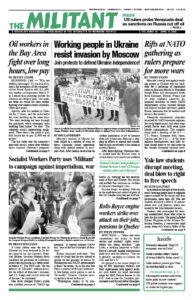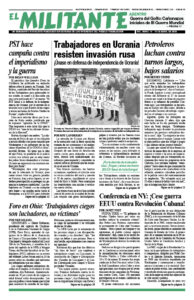Moscow’s war against Ukrainian independence has opened rifts with the former Soviet republics in Central Asia whose governments have traditionally followed the Russian rulers’ lead. The capitalist rulers in Kyrgyzstan, Kazakhstan, Tajikistan, Turkmenistan and Uzbekistan — bounded by Russia, China, Afghanistan and the Caspian Sea — are all seeking some distance from the Russian regime today.
Abdulaziz Kamilov, Uzbekistan’s foreign minister, called for an end to Moscow’s “military actions and violence” in Ukraine. “Uzbekistan recognizes Ukraine’s independence, sovereignty, and territorial integrity,” he told the country’s Senate March 17. “We do not recognize the Luhansk and Donetsk republics.” Expanded control over these Moscow-occupied Ukrainian territories is a central goal of the Russian invasion.
Kazakhstan’s deputy foreign minister, Roman Vassilenko, told the German newspaper Die Welt March 28 that in seeking new capitalist investment his government didn’t want to find itself on the wrong side of a new “Iron Curtain.” This was Washington’s term for the militarized dividing line between Eastern and Western Europe during the Cold War.
Kazakhstan, the region’s largest country, was shaken by a working-class uprising in January. The regime there invited in Russian troops to help suppress the massive anti-government protests. Moscow expected greater obeisance in response, but Russian forces were asked to leave a week later.
Kazakh authorities allowed a demonstration of 3,000 people against Moscow’s war in Ukraine to go ahead in Almaty, the country’s largest city, in early March, although they barred further actions.
The far-reaching sanctions imposed on Russia by Washington and other imperialist powers not only hit hardest at working people there, but also impact toilers in these Central Asian countries. Over 2.5 million migrants from this region worked in Russia in 2021, sending home remittances that are crucial for their families and the economies of Kyrgyzstan, Tajikistan and, to a lesser extent, Uzbekistan. The blow to Russia’s economy from the sanctions, already being felt, will deal blows to working people throughout the region.

